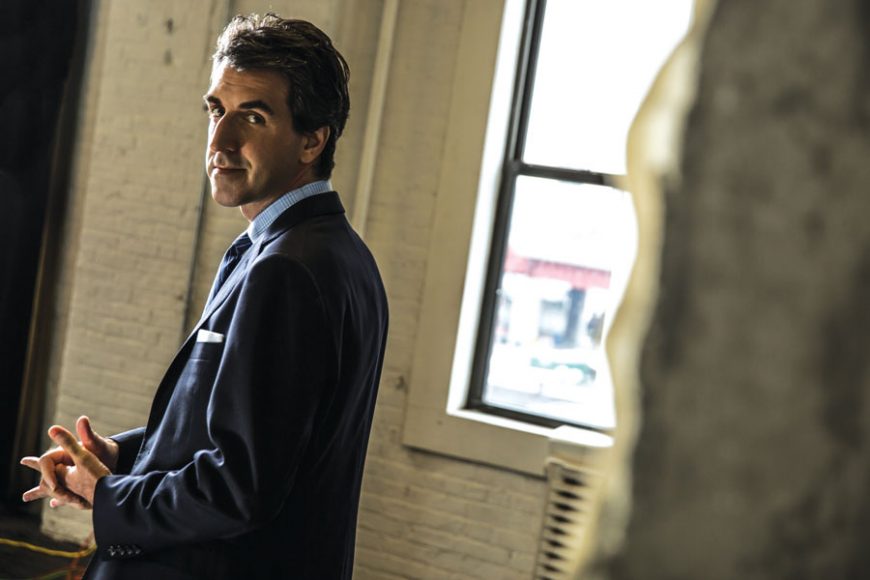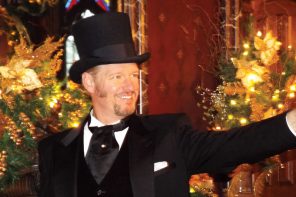Theatergoers will most likely know the name of musical theater composer/ playwright and Ossining native Jason Robert Brown from his award-winning musicals “Parade,” “The Bridges of Madison County” and “The Last Five Years,” the last of which was made into a movie starring Anna Kendrick and Jeremy Jordan. Brown would like to see “Parade” — which he calls “a very cinematically designed experience” that represented a collaboration with director Hal Prince, writer Alfred Uhry and himself — make the leap to film, as well. He would also be “thrilled” if “13,” which “may actually get made into a movie” came to pass, in spite of its short run on Broadway.
Brown, who left Ossining at the age of 5 says his primary memories of the area involve Sing Sing Correctional Facility. He became a Rockland County kid, where he lived until he went to college. A Manhattan resident, which “makes the most sense” for the work that he does, Brown hopes that “once the kids are out of school and things have slowed down a little bit,” he can “get back to a way of life that feels more like” the one in which he grew up. He points out that in the song “Anywhere But Here,” from his musical “Honeymoon In Vegas,” a woman sings about taking a train to Mount Kisco from which she glimpses a house with a swing set and thinks that’s the life she’s supposed to have. “I sometimes feel like her,” he adds. WAG recently spoke with Brown about his theater work, as well as his new album “How We React and How We Recover.”
“Wearing Someone Else’s Clothes,” your debut solo album, was released in 2005 and your second solo album “How We React and How We Recover” (Ghostlight) was recently released. After a 13-year span between albums, why was it now the right time for you to record a new one?
“The original plan, when ‘Someone Else’s Clothes’ came out, was to do an album every year, every two years, start a career as a singer/songwriter. I think two things happened. The first was that touring, which you have to do in order to get the album to sell, was taking me away from my family all the time. It was gratifying to do the concerts, but it was a lonely life on the road. I didn’t feel like it was a trade-off with which I was entirely comfortable.
“The second thing that happened was between the time that ‘Someone Else’s Clothes’ came out and now, I’ve had four shows on Broadway and they’ve taken up a lot more of my time than I had expected, which sounds stupid and naïve. I think I had assumed that I could pull off the singer/songwriter things around the shows. That proved not to be true. I could only handle having one career at a time, if I was also going to have a family and a life.”
Speaking of family, one of the distinguishing things about “How We React and How We Recover” is the way your daughters are referenced in the songs “Hope,” “A Song About Your Gun” and “Hallowed Ground.”
“I think my daughters are very happy about it in the first place. The album is very much a sort of appraisal of my life at this point. So as much as my daughters show up on the album, my wife (songwriter Georgia Stitt) shows up on the album. Politics shows up on the album and my entire being at 47, 48 years old shows up on the album. That is the difference between this and the musical theater work. This is stuff that comes from inside me in a very direct way. I think of this work as much more autobiographical than, for example (the stage musical) ‘The Last Five Years,’ which everyone just assumes is me having taken dictation on my first marriage, which is not, in fact, the case.
“I think of this album as trying to translate my direct experience into song. When I have to sing as myself, it’s not any different than when I have to write for character. When I write for character, I have to embody the character. For me to write songs for myself, I have to be able to embody myself and put myself into song. Which is not true of (the song) ‘Melinda’ (laughs) but, other than that, I think in most cases of the album it’s pretty clearly me in there.”
“Hope,” which opens “How We React and How We Recover,” was recorded by Betty Buckley on her most recent live album. Buckley has been singing and recording your songs for several years. What does it mean to you to have someone such as Buckley as a champion of your work?
“I think to have Betty Buckley as a champion of my work is thrilling and unexpected. What’s amazing about Betty is when I first came to New York she was probably about the age I am now and she, unlike anyone else of her generation of performers, said, ‘This is the kind of material that I want to sing,’ and she took on (my song) ‘Stars and The Moon.’ She’s been singing my songs for more than 20 years now.
“It’s a real tribute to her — not so much, ‘Oh, what great taste she has’ — (but) that she wanted to explore material by newer writers — not just explore it, but really commit to it. You see that on the ‘Hope’ album. On the story-songs album before that, she does three of my songs. She’s always been a champion of a very specific kind of writer. I guess I just fall into that box, which I’m very happy to do.”
She also does “Any Major Dude,” a song you wouldn’t expect to find on a Betty Buckley album.
“Somewhere inside she is a rock ’n’ roll chick. I also am a rock ’n’ roll guy mashed up with a theater guy mashed up with a jazz guy and a whole bunch of other things. I think that’s her as well. Her musical personality is trying to mash up all of these things. Going to one of Betty’s concerts, every song is unexpected and yet every song is entirely her. She manages to live within all of them. To be part of the canon work she wants to celebrate is thrilling.”
I’m glad you mentioned that you are a mash-up of all of these things, because the album incorporates a variety of musical genres, including the Latin-influence of “Melinda,” the R&B of “The Hardest Hill” and “Caravan of Angels” and the subtle Americana twang of “Fifty Years Long.” What is the importance of that kind of musical variety in your work as both a songwriter and a performer?
“My philosophy is that music is fun. I just like to make music. You can put on all kinds of different disguises and costumes. What unifies all of the work on this album and, pretty much all of the work I’ve ever done, is that it is music created by a bunch of people all playing together in the same room. I’m very much about live musicians playing instruments. Within that, I don’t particularly want to be bound by genre. I have particular affinities for R&B and gospel and Latin stuff. But then I listened to all of these singer/songwriters growing up. What you described as a sense of Americana, that country feel, I come by it honestly. I think that so many of the singer/songwriters in the late ’60s and ’70s came out of folk music and what happened with an acoustic guitar and a voice. You can’t listen to James Taylor all your life and not have a little bit of “Carolina” in you.”
That’s interesting because you can hear the 1970s sound in “Everybody Knows,” while the lyrics are full of 21stcentury social media references, making for an interesting juxtaposition.
“Everybody Knows” was the last thing I wrote for the album, which I threw off in an afternoon and is kind of my favorite track. There’s a fantastic band out of New Orleans called Tank and the Bangas. They did a ‘Tiny Desk’ concert on NPR. They’re young musicians who come from this world of ‘How do you make soul music that is played live in the room with real people?’ The intimacy and all of the jazz color of what they did, I loved it. I stole some of their ideas and started playing around with them and all of a sudden, this song came out. It is to me both deliberately retro and in a way that will probably be very embarrassing in three weeks. (laughs) There are some things that people my age are not supposed to do and one of them is try to be hip. Unfortunately, I fell into the trap and I happen to love it.”
I’m glad you mentioned jazz, because jazz vocalist Kate McGarry provides the vocals for the song “One More Thing Than I Can Handle.” Why was Kate the right choice to sing this song?
“I actually wrote it for Kate. (Jazz pianist and composer) Fred Hersch had sent me some CDs where Kate was singing some of his stuff. I wrote him and asked who she was. She’s amazing. He introduced us by email and then Kate sent me some of her own CDs. I love what she does, especially in the work she does with her husband, Keith (Ganz). They’re forming a vocabulary of jazz that is not mannered and isn’t drawn from the bebop world but is instead their own translation of it. It feels so fresh to me. She performs with such honesty.
“I wanted to write something for that voice, for what she does. I wrote that piece and I sent it to her. She said, ‘Wow, there’s so much text here,’ as opposed to the standard jazz number. There are pages and pages of verbiage. What was great was that her first instinct was to go, ‘Oh, this isn’t really me,’ and then she leaned into it and said, ‘Who am I kidding?’ She dug into that song. There’s not histrionics or overt theatricality to it. She lives inside that text so beautifully and, when it’s time for her to do the improvised solo in the middle, it comes completely out of the emotion of the rest of the song. There are very few theater singers who could do a scat solo in the middle of a song anyway, but I felt like the integration of her emotional vocabulary, from one end of the song to the other was so specific and so rare and beautiful.
Are there any new theatrical projects in the works that you would like to mention?
“There are always new theatrical works on the horizon. There’s nothing that I’m able to announce yet, because they’re all off a couple of years. I’m keeping my cards close to my vest until I know which one is in pole position. For the time being, I’ve got the album and I’ve got my concerts. Every month, I’m in residency at a club called SubCulture down in the Village. We’ve just done our 42nd concert there. Every month I have different guests who come and sing and make music with me. For almost four years now, that’s been one of the main creative outlets in my life. I’m excited that that’s going to keep going on, once a month throughout the new year. A lot of the songs on this album were actually born in that residency while I was there with my band, feeling the pressure to present new music. I also have an enormous commitment to The Brady Center to Prevent Gun Violence.”
Jason Robert Brown performs monthly at SubCulture, at 45 Bleecker St. in Manhattan. For more, visit subculturenewyork.com.




